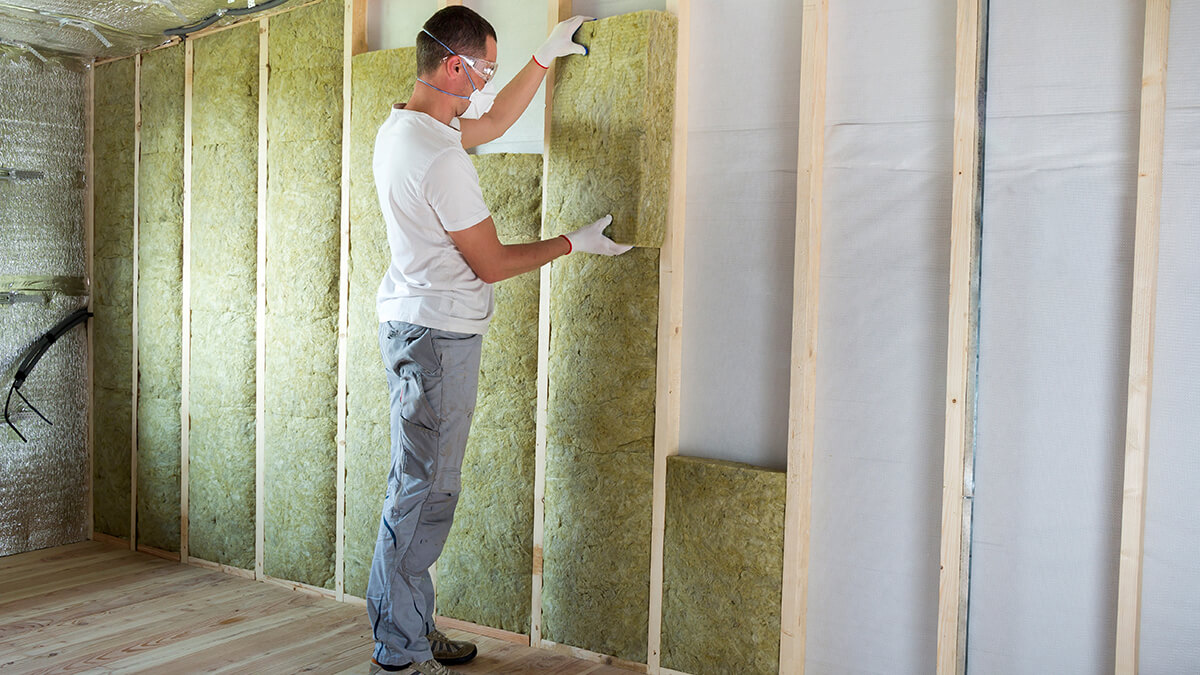First Community Financial Group, Inc. Blog |
|
Before applying paint, paper or other covering to your walls, you need to repair any holes.
Before you get startedFill nail holes and small punctures with spackling compound. When dry, sand lightly. If the hole is next to an electrical outlet, you may be able to conceal the damage with a larger outlet box or an oversized outlet cover plate. For larger holes, you will need to patch the damaged area. CAUTION! Determine where the electrical wiring is located before cutting into a wall. Small Dry Wall Patch HolesIf the hole is no bigger than two inches, repair with fiberglass tape. Stretch tape across the hole. Apply two or three coats of joint compound and sand between coats. Step 1: Enlarge and Square UpCut a square area larger than the hole with a utility knife or keyhole saw. Step 2: Prepare Backer BoardsCut two backer boards so they are 2 to 3 inches wider than the hole. Step 3: Secure Backer BoardsPlace a backer board inside the hole at top edge. Secure with 1-1/4 drywall screws, holding the board in place as you work. Tighten until screw heads are below the surface. Place second backer board inside lower edge of opening. Secure with screws. Step 4: Install PatchCut patch to fit opening. Screw patch to the backer and tighten until screw heads are below the surface. Step 5: Tape SeamsApply strips of fiberglass tape over seams. Step 6: Apply Joint CompoundCover tape with a thin coat of compound. When dry, sand lightly. Apply two more coats. Feather and sand each coat until the surface is smooth. Patching Large HolesFor holes larger than 8 inches, cut drywall back to middle of the studs bordering the hole. Butt backer boards to studs and secure behind drywall with screws. Fit patch into opening. Secure to the studs and backer boards with screws. Finish with fiberglass tape and joint compound. Materials you will need:
Tools you will need:
Content furnished by Foremost Insurance.
0 Comments
 From genetically modified crops to the environmental and health effects of pesticides, more and more Livingston and East Texas residents are questioning whether they should grow what they eat. Wherever you stand on the issues surrounding today’s food supply, however, there are several good reasons to start your own garden:
Clearly there are plenty of benefits to gardening. But how do you get started? Here are some important tips from the Oregon State University (OSU) Extension Service, which, like similar services around the country, provides helpful community resources on agriculture and other topics. Pick the Right Site “Choosing a garden site is as important as selecting the vegetables to grow in it,” according to the OSU Extension website. “All vegetables need sunlight and fertile, well-drained soil, and they will contract fewer diseases if the site has good ventilation.” Here’s what to consider before marking your garden plot:
Choose What to Plant Check with a local gardening organization or search the Web for what vegetables are best for your specific situation and climate. Here are three factors to keep in mind when you’re getting ready to plant, according to the OSU extension:
Water Wisely The best way to water is by monitoring your garden, rather than simply adhering to a set schedule. Follow guidelines for your specific plants, and avoid these common problems, as noted by the OSU Extension website:
For more specific advice on gardening in our zone in East Texas, check with the local university extension program. And, don’t worry; you don’t have to be an expert to enjoy homegrown food. You just need to be willing to put in a little time and effort — and get your hands dirty! Is your hard-working kitchen getting cluttered and unmanageable? If you need more storage, but every cupboard, shelf, nook and cranny is filled, it's time to take a second look at your use of space. Chances are you can reorganize and reclaim more storage than you ever thought possible.
Well-planned cabinets, drawers and shelves maximize space, save steps and eliminate frustrating searches for necessary kitchen tools and gadgets. An organized kitchen doesn't cost a lot of money, but does require a practical plan to keep items handy and easy to reach. Here are a few ideas to help make efficient use of your kitchen space and create some new storage areas as well. Clear the Clutter Your kitchen holds an awesome amount of stuff. The more stuff you collect and store in the kitchen, the more you have to manage. It makes sense to get rid of anything you don't need or want anymore. Reducing clutter is a must. If you do nothing else to organize your kitchen, do this. A well-designed, folding step stool is an indispensable tool for your reorganizing strategy. Choose one that helps you access storage space without requiring much of its own. Be sure it's sturdy and can easily hold your weight while you're stretching and reaching into upper cabinets, shelves and closets. Pick a starting point and begin at the top. Work one shelf, cupboard or drawer at a time and remove everything you find. Most items you run across will require a decision, so group your “stuff” into categories. For each item, ask yourself:
Remember these tips:
To make the most of potential kitchen storage, think beyond the individual cabinets, shelves and closets to every available inch. A careful inventory of existing space can help you plan how to use it effectively. Start your planning process by searching for unused or underused spaces. Examine all surfaces, including the area above or below appliances, behind doors and unused floor space. Grab a notebook and pen and make a list of any potential storage spots or areas that can be better organized.
Now that you've cleared out the clutter and discovered a few new storage areas, it's time to take your final step toward creating an efficient, well-organized kitchen. Think of your kitchen as a single room with three separate work centers: preparation, cooking and cleanup. Keep in mind where, what and how you use an item before you put it back into each cabinet or drawer. Easy access and return is important. If you can get to something and return it to its designated space without a hassle, the chance of your kitchen staying organized is greater. Here are a few ideas to get you started:
How to Arrange a Food Pantry When your pantry or food storage cabinets become packed with food that isn't sorted or organized, you will eventually have a huge mess on your hands. The pileup of ingredients can be avoided without spending a lot of time or effort. It just takes about an hour from start to finish. Start by emptying pantry shelves and moving everything to boxes or a nearby countertop. Clean shelves with warm, soapy water and wipe dry. Before you put things away, think about how you will fill prime and non-prime spaces. For example, prime, eye-level shelves should be reserved for your items used most often.
Kitchen Storage and Organizing Resources
Insulation plays a leading role in keeping a house cool during hot seasons and warm during cold seasons. This protection from radiant heat and cold drafts helps you to save energy and money in the long run.
If you are interested in insulating your house, here are some useful tips from The Family Handyman that will help make your DIY project a success. You can check out a full article on mastering the art of installing home insulation below from Foremost ( Farmers) Insurance. Tips on installing home installation | Foremost Insurance Group  Solar panels can be economically and environmentally sound, and they’re more accessible than ever. According to one research firm, U.S. homes and businesses installed a new system every four minutes in 2013. But, is solar power right for you here in {city, state or region}? To help you address the question, here are five things to think about before making the switch:
Renewable power – it can help protect your from rising energy costs and even power outages, not to mention the good it does for the environment. Just be sure to consider your options and all the costs involved before making the leap. Content provided by Safeco Insurance.  by The Foremost Creative Team Regular maintenance will keep your siding looking new and lasting longer. Why is it so important to regularly maintain your siding? Like the skin on your body, there are two main purposes that siding fulfills: appearance and protection. It protects your home against natural elements and pests, adds stability to the frame of your home, helps insulate and it also adds character to the outside of the home. Although there are several different types of siding you can choose from for manufactured homes, the three most popular include metal siding, like aluminum or steel, vinyl siding or a natural wood siding. And each kind of material needs to be maintained differently. Washing Give your home a good washing for a fresh new look. Note: Don't wash wood siding. Heavy exposure to water might result in decay, chipping, bowed or expanded panels, disintegration or shrinkage. Read below to learn about proper maintenance for wood siding.
Vinyl Siding
Wood Siding Cedar, Cypress and Redwood sidings are popular siding choices that offer natural beauty to the outside of a home. But wood siding requires more upkeep than most siding because of its natural surface. With regular maintenance and care, you can prevent damage and keep your wood siding looking beautiful for several years.
Aluminum Siding Keep aluminum siding looking like new with a regular cleaning every six months to prevent oxidation and/or corrosion over time. For metal siding, oxidation and corrosion are common problems that wear and tear at the outside of your home. Taking care of these problems as soon as they occur could save you from having to replace your siding altogether. Corrosion Corroded areas leave dark spots on the siding. These are caused by moisture being exposed to the metal surface for extended periods. Check for rust-colored stains in places that tend to stay wet longer, such as under eaves or recessed entryways. If you find corroded areas, be sure to get rid of the spots before they spread further. For both aluminum and steel siding, sand out the corrosion blisters down to the bare metal, then spot prime with an anti-rust primer. Oxidation Oxidation leaves a white chalky film on the siding that can dull the exterior of your home. Keep your siding clean to prevent oxidation from forming. If your siding looks faded from oxidation, contact a professional manufactured home washer. A professional can clean your house in less than an hour with high-pressure hoses. Scratches Keep a minor scratch on your metal siding from becoming a major problem.
Painting Metal Siding Apply a fresh coat of paint to the siding of your home to keep it looking like new. If you need to paint just one panel, consider taking that panel to an auto body shop to be painted. They should be able to match the color. If you plan to paint the whole exterior of the home and want to tackle the project yourself, wait for a calm and overcast day to paint. Paint needs to dry slowly and the sunlight and wind will only speed up the drying process. Prepare to paint:
Before you're ready to apply an oil-based metal paint primer, the siding needs to be completely dry. Mix one gallon of the oil-based paint primer with one pint of paint thinner. Tint the primer to a lighter shade of the paint color you choose. The primer will help the new paint adhere to the surface and provide an extra color coat. Let the primer dry completely before adding the next coat of paint. Use an acrylic-based, latex exterior house paint over the primer. A high volume of acrylic resin in the paint will make the paint job last longer. Invest in premium paint, brushes and roller covers. Bargain paint is no bargain if you're looking for better coverage, longer wear and a more washable surface. How much paint do I purchase? To compute the amount of paint needed, multiply the height of the house times the entire perimeter. Do not subtract for windows because this area will roughly equal the trim, eaves and soffits. Divide the total square footage by the number of square feet per gallon cited on the label of the paint. |
Contact Us(936) 327-4364 Archives
July 2024
Categories
All
|





 RSS Feed
RSS Feed
